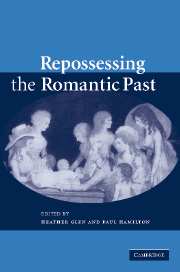Book contents
- Frontmatter
- Contents
- Notes on contributors
- Introduction
- PART I DISSENT AND OPPOSITION
- PART II REOPENING THE CASE OF EDGEWORTH
- PART III DIFFERENT DIRECTIONS
- 8 Coleridge's stamina
- 9 Elizabeth Hamilton's Translation of the Letters of a Hindoo Rajah and Romantic orientalism
- 10 Jane Austen and the professional wife
- 11 High instincts and real presences: two Romantic responses to the death of Beauty
- Marilyn Butler: a bibliography
- Index
9 - Elizabeth Hamilton's Translation of the Letters of a Hindoo Rajah and Romantic orientalism
Published online by Cambridge University Press: 15 December 2009
- Frontmatter
- Contents
- Notes on contributors
- Introduction
- PART I DISSENT AND OPPOSITION
- PART II REOPENING THE CASE OF EDGEWORTH
- PART III DIFFERENT DIRECTIONS
- 8 Coleridge's stamina
- 9 Elizabeth Hamilton's Translation of the Letters of a Hindoo Rajah and Romantic orientalism
- 10 Jane Austen and the professional wife
- 11 High instincts and real presences: two Romantic responses to the death of Beauty
- Marilyn Butler: a bibliography
- Index
Summary
In her pioneering 1990 essay ‘Byron and the Empire in the East’, Marilyn Butler demonstrated the benefit of attending to the historical contexts of British colonialism in interpreting some of the key poetic narratives of Romantic orientalism. Her main example, a poetic debate between Southey and Byron about the politics of monotheistic religion under the aegis of ‘orientalism’ (in The Curse of Kehama and The Giaour), took on new urgency when considered in the light of contemporary arguments about the evangelization of Britain's newly won empire in India. The triumph of the evangelical party, which Southey strongly supported, resulted in the insertion of a ‘pious clause’ into the 1813 India Act, permitting Anglican missionaries to operate in British territory for the first time. Butler's understanding of ‘Romantic orientalism’ here subsumed, as it surpassed, the established scholarly understanding of the oriental topos as either a Schlegelian realm of spiritual inwardness, or else an exotic Flaubertian theatre of sexuality and cruelty in which the European ego might expatiate without limits.
Butler's approach also eschewed the traditional literary critical reading of the oriental settings of so many popular poems of the period as merely picturesque backdrops to characteristic Romantic themes of love, death, heroism, and betrayal. Neither was she entirely convinced by Edward Said's Foucauldian critique of orientalism as ‘a Western style for dominating, restructuring, and having authority over the Orient’, although she did follow Said in reading orientalism as first and foremost a discourse of imperial power.
- Type
- Chapter
- Information
- Repossessing the Romantic Past , pp. 183 - 202Publisher: Cambridge University PressPrint publication year: 2006
- 3
- Cited by

